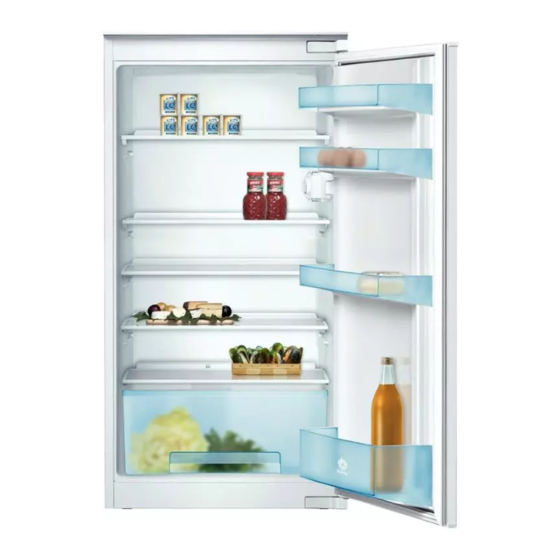
Table of Contents
Advertisement
Advertisement
Table of Contents

Summarization of Contents
Information concerning disposal
Disposal of packaging
Instructions for environmentally friendly disposal of appliance packaging materials.
Disposal of your old appliance
Guidelines for recycling old appliances and recovering valuable raw materials.
Safety and warning information
Before you switch ON the appliance
Read operating and installation instructions carefully for important usage information.
Technical safety
Information on flammable refrigerant (R600a) and potential hazards.
If damage has occurred
Immediate actions to take in case of appliance damage, including fire hazards.
Important information when using the appliance
Key precautions and warnings for safe and correct appliance operation.
Appliance use with freezer compartment
Specific warnings for storing bottled drinks and touching frozen items.
Children in the household
Safety measures to protect children from packaging and the appliance itself.
Connecting the appliance
Installing the appliance
Guidance on suitable room conditions and minimum distances to heat sources.
Getting to know your appliance
Appliance components and diagrams
Identification of key parts like temperature selector, shelves, and compartments.
Ambient temperature and ventilation
Understanding climatic classes and ensuring proper air circulation for optimal performance.
Ventilation importance
Ensuring ventilation openings are clear to prevent increased power consumption.
Operating tips
Temperature variations in refrigerator
Factors affecting refrigerator compartment temperature and recommended actions.
Storing of food
Cold zones in the refrigerator
Identifying and utilizing the coldest and warmest zones for food storage.
Storing food notes
Food storage arrangement
Recommended placement of different food types in compartments and door.
Usable capacity information
Where to find details on the appliance's usable capacity.
The freezer compartment
Using the freezer compartment
Purpose and proper closing of the freezer compartment door.
Freezing and storing frozen food
Purchasing deep-frozen food
Tips for buying and transporting frozen food to maintain quality.
Maximum freezer capacity
Importance of quick freezing and not exceeding appliance limits.
Freezing capacity details
Information on freezing fresh food and its impact on refrigerator temperature.
Freezing food
Correct food wrapping techniques
Steps for wrapping food and recommended materials for freezing.
Unsuitable wrapping materials
List of materials not recommended for wrapping food for freezing.
Suitable wrapping materials
List of materials suitable for wrapping and sealing food for freezing.
Thawing frozen food
Note on refreezing thawed food
Conditions under which thawed food can be refrozen.
Switching OFF and disconnecting the appliance
Switching OFF the appliance
Procedure to turn off the refrigerating unit and interior light.
Disconnecting the appliance
Steps for safely disconnecting the appliance for prolonged periods of non-use.
Defrosting aids
Accelerating defrosting
Using hot water pans to speed up the defrosting process safely.
Warnings on defrosting methods
Prohibits electrical appliances and naked flames for defrosting.
Cautions for defrosting sprays
Potential hazards associated with using defrosting sprays.
Refrigerator compartment defrosts automatically
Condensation channel and drain hole maintenance
Importance of keeping the condensation channel and drain clear for proper drainage.
Cleaning the appliance
Door shelf removal for cleaning
Instructions for removing door shelves for easier cleaning.
Cleaning agent restrictions
Advice against using abrasive or acidic cleaning agents and solvents.
Dishwasher cleaning prohibition
Warning not to clean shelves or containers in the dishwasher to prevent warping.
Operating noises
Normal operating noises
Descriptions of typical sounds like humming, bubbling, and clicking.
Preventing operating noises
Troubleshooting tips to eliminate common noises by ensuring proper appliance placement.
Appliance leveling
Ensuring the appliance is level to prevent vibrations and noises.
Appliance clearance
Maintaining adequate space around the appliance to avoid operational noise.
Securing drawers and storage
Addressing wobbling or sticking drawers and storage areas.
Separating bottles and receptacles
Preventing noise by ensuring bottles and containers do not touch each other.
Eliminating minor faults yourself
Interior light not functioning
Steps to troubleshoot and replace a defective light bulb.
Frozen food frozen solid
Advice on loosening frozen food without damaging the appliance.
Thick frost layer in freezer
Procedure for defrosting the freezer compartment to manage frost build-up.
Wet refrigerator compartment floor
Troubleshooting a wet floor by cleaning the condensation outlet.
Refrigerator compartment too cold
Adjusting the temperature selector to resolve excessively cold conditions.
Frozen food is thawing
Addressing thawing issues related to ambient temperature or appliance settings.
Refrigerator has no cooling capacity
Troubleshooting steps for lack of cooling, including power and fuse checks.













Need help?
Do you have a question about the KI5BYN6 and is the answer not in the manual?
Questions and answers